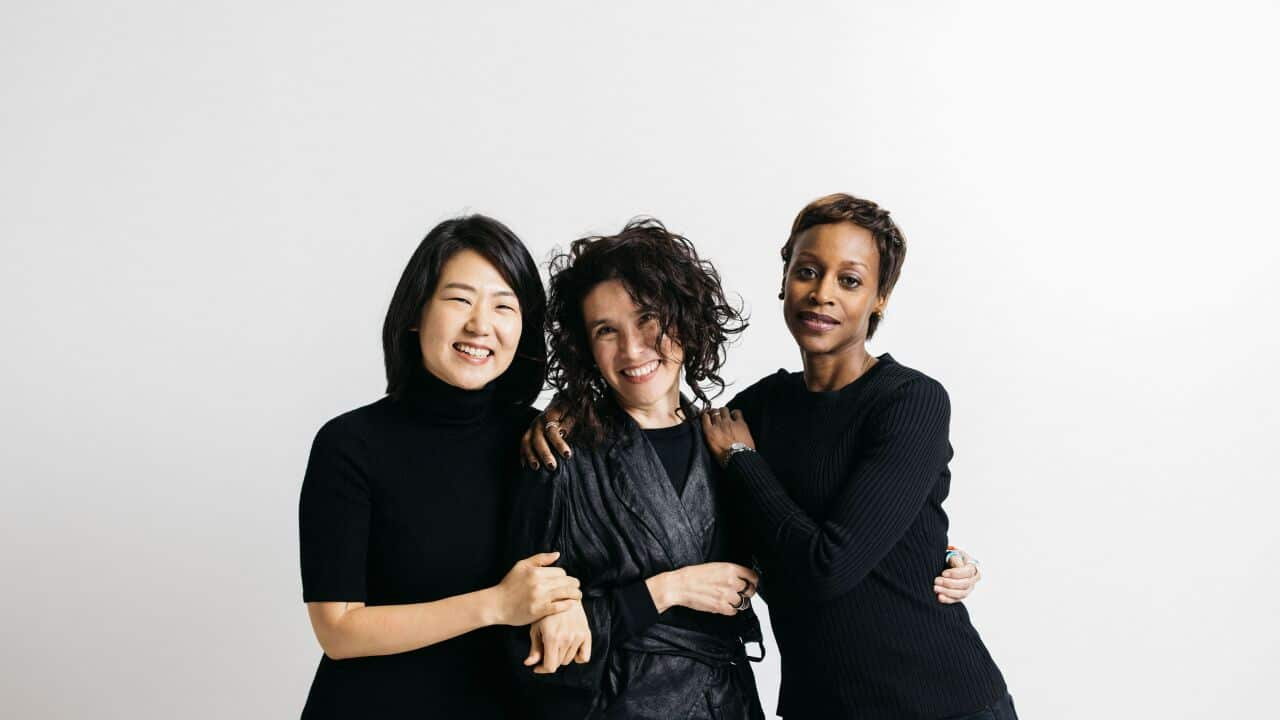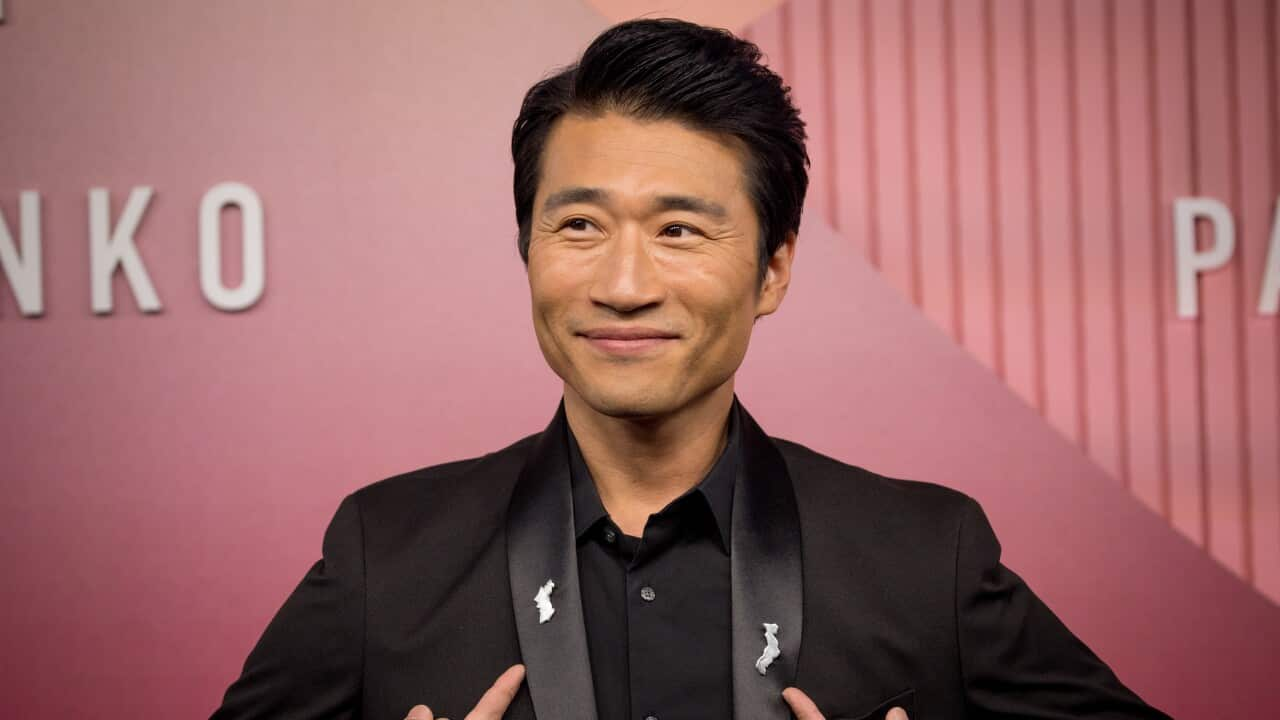In this episode of Like Us, Anna Yeon, Noè Harsel and Zione Walker-Nthenda talk about the many ways that they personally find themselves changing the ways in which they behave or speak depending on the environment they find themselves in at any particular time.
Does everyone do it? As Zione points out, this shifting of behaviours can be a constant for people who are mixed-race, whether it is done consciously or not.
I feel like I live in code switching land permanently, well maybe not permanently but I am switching all the time... I can’t tell you where the line is.Zione Walker-Nthenda
According to research by Harvard Business Review, code switching is not all that good for you psychologically. There are definite downsides.
I realise how much effort I am doing for other people when Mama Song points out some of the code switching behaviour that I have taken on... to make the group of people in that situation, either Australian or Korean, more comfortable.Anna Yeon (Song)
Follow Like Us in the SBS Radio app, at www.sbs.com.au/likeus or in your favourite podcast app such as Apple Podcasts or Spotify.
Like Us is hosted by Anna Yeon, Noè Harsel and Zione Walker-Nthenda.
Recorded and edited by Michael Burrows, Brand Music.
Transcript
Noè: We would like to acknowledge the traditional owners of the land we are broadcasting from, the Boonwurrung people of the Kulin Nation, we pay our respects to their Elders past and present. We would like to also acknowledge all Traditional Owners from all Aboriginal and Torres Strait Islander lands you are listening from.
What do you get when a Japanese-Jewish woman, a Korean woman and a Nigerian-Malawian woman get together to chat about living, working and raising families in Australia? You get ‘Like Us’, a podcast that is Anna Song, Noè Harsel and Zione Walker-Nthenda — 3 Australian women from different cultural backgrounds, discussing their personal relationship with Australia and Australia’s relationship with them.
Noè: Hello Everyone! Hi Friends, Zione, Anna
Zione: Good to see you all. Yes, yes, yes, what are we talking about today?
Noe: Okay so, I am sure you’ve all seen it either taken off, or the piss taken off, like the piss taken off or for real like that Obama thing where he was backstage, like in the changing room for some sporting event and he had shaken the hands of the white managers or coaches and then he did some fist bumpy thing with the African American players right? He code switched basically.
Anna: Like a bro thing
Noe: Like a bro thing. So yeah, so like code switching. That whole thing where you are doing that culturally appropriate, I am air quoting here, behaviour dependent upon who you are speaking to or dealing with. Now I am sure all of us have done that in so many ways, if we are dealing with people who understand us or dealing in the workplace with the white majority. I love saying that, it makes me feel like I am on some sort of political platform.
Anna: But also as you are saying that, like these important words, I am like I miss Barack Obama and Michelle Obama so much…
Noe: So much, but you follow them obviously on all the social platforms, so you don’t have to go that far.
Zione: They are not gone.
Anna: I need to move on just a little bit.
Noe: Just a little. I mean you can still watch everything that they do.
Anna: I miss his fist bumps and like his Bro shake kind of thing…
Noe: You know you can watch it on repeat on every single platform.
Anna: that’s what I am going to do when I go home.
Noe: You know what I am going to do with you, I am going to forward you everything that I’ve got. It’s going to be hours of entertainment.
Anna: I say stop but don’t stop.
Noe: The way you are saying stop with that wink in your eye, Anna Song… oh yeah… I see. I gotcha, I gotcha. Don’t you worry about a thing. But what I want to talk about with this code-switching thing is like I know we all do it. And we all kind of think, yeah but that’s okay. But I read recently in one of these you know, Harvard review studies or something and please don’t go looking that up because I say something in the loosest way. But that it’s not all good stuff. It’s actually considered to be somehow harmful.
Zione: Oh my goodness. I really desperately need to hear this, okay, because I feel like I live in code switching land permanently, well maybe not permanently but I am switching all the time. So I think like if you have grown up in an environment where your parents are from different cultures, I switch codes between the two of them so I sound differently to my mother and my father.
Noe: Actually Zione, you are probably, all of the mixed-race people are probably at the most risk in code switching.
Anna: Well they do it from birth basically.
Zione: Yeah of course because my mother has a different accent to my father, they have different cultural references, so I switch with both parents and then in all the environments I’ve been in as a minority, I am code switching there as well. And then I had gone to international schools that were either predominantly British or American so I can speak in both those two accents so then depending on who I am talking to, so Noe you have an American accent, so I sound more American. If I am with my British relatives, I sound more like them.
Anna: So, it’s like a dialect.
Zione: It is a like a dialect, but it’s a constant in and out thing for me and I can’t tell you where the line is. And I think it might have been your husband who asked me about my accent, and I tend to say to Australians that I feel my most authentic with Australians because I can’t sound Australian even though my British relatives think you sound so Aussie, say that again. I’m thinking, oh my God, far from it. But it because I can’t code switch as, I don’t know. I can’t code switch to be more Australian. Whereas with other people I can be more like them.
Anna: I think Aussie speak is really hard. I think there is a very particular sound to Australian English…. Especially guys, they seem like have this guttural…. I’m not going to do it but em…
Zione: You sort of have to be raised here to speak in a proper Australian accent.
Anna: that’s right. Whereas an American accent is so easy to pick up.
Zione: Maybe it’s because we’ve watch American shows all our lives.
Noe: And also there are so many types of American accents.
Anna: Are you going to into a valley girl…
Noe: Totally.
Zione: Are you going to code switch into that?
Noe; yeah, like what? Like what?
Anna: That’s not your natural, like where you are from in the U.S.
Noe: No, no of course not but I think more than that is the cultural code switching so you know…
Anna: Well Zione, so if you ever need like a bit of like, I don’t know…I could always lend you my mum, like Mama Song because she…
Zione: Will she set me straight? Set me right?
Anna: She always does this to me, of like, basically calling me out when I am doing code switching without even like knowing the concept, when it’s my bodily functions.
Noe: Oh, Wow, wow… Step it back girl.
Anna: So when, like the burp, the burping. It is really a bug bear of Mama Song’s.
Zione: But a different burp for different cultural contexts?
Anna: So I burp, like the same burp my burp doesn’t have different cultural, you know, but I say excuse me because I am trained in doing that to be respectable in the English speaking contexts and my mum like, calls me out and says after a meal in Korean culture
Zione: Burping says you are satisfied
Anna: That’s right.
Zione: There’s nothing to apologise for.
Anna: That’s right, and she calls it out every time I say or ask her to say it in a restaurant or something. She’s like, we don’t do that.
Zione: Yeah right. I get that.
Anna: That’s how I know I am so used to the code switching in the smallest way and when I say bless you when someone sneezes like, sometimes my mum like catches these moments and she points them out to me.
Noe: So what’s the bless you?
Zione: Like when someone sneezes in a Korean context, you wouldn’t, is that right?
Anna: No.
Noe: it’s an English thing. I get you.
Zione: Yeah, it doesn’t exist in my cultural context either.
Anna: Sometimes it’s actually quite exhausting. There is a lot of energy that goes into consciously, unconsciously knowing which code.
Zione: But also, which is your most authentic self?
Anna: There isn’t, there isn't.
Zione: Because we are all entitled to also evolve. So maybe the saying bless you or the saying sorry when you burp in now Anna 2022. That’s the Anna, that’s you.
Noe: Is it just habitual as opposed to authentic? Because I guess, I hear yours as well Zione when you are saying things like you are so used to code switching you don’t even know the lines to which codes you are switching into. You just automatically fall into it. It’s like you are saying with the excuse me or whatever, it’s automatic slip into something as opposed to a conscious decision that this is who I am. I find that you don’t know where the differences are you just sort of doing it and I guess that’s where the studies are saying things like, this where it becomes dangerous. I suppose that’s an overplay of the word, but this is where it becomes problematic because it’s the notion of self and the notion of who you are and the notion of cultural authenticity.
Zione: But should self be this immutable thing that can’t be changed, right? Because I guess for people like me what we are saying is, we feel malleable in some way, like culturally malleable because we have always had to be.
Noe: Does it affect your sense of belonging, I guess, does it affect a sense of self and I guess a sense of belonging? Does it take away from that sense of belonging?
Anna: Let me put it this way. I realise how much effort I am doing for other people when Mama Song points out some of the code switching behaviour that I have at some point taken on as my task to behave in a way that makes the group of people in that situation, either Australian or Korean, more comfortable.
Noe: Yeah, yeah, yeah.
Anna: And I have to do a whole heap of code switching when I visit Korea.
Noe: Yes, yes, I am sure because it is no longer your everyday.
Anna: For example, my mum’s friend is hilarious like when I say the word log out exactly as I’ve said it now. Like I’ve said it with an English accent, I get teased for it because it is used in Korean, but it’s pronounced like a Korean word.
Zione: And you can say it in that way too
Anna: That’s right, that’s right. So like, I don’t have any comedic talents as far as I’m concerned. But sometimes inadvertently, if I drop the ball on the code switching, I do become different. I become funny and in a social context it’s fine, it’s entertaining but I think it will make a difference if that starts to kind of contributing to a sense of credibility.
Noe: That’s exactly right.
Anna: Like if I was working and it was in a professional context for example.
Noe: Correct, correct and I think that’s the whole point, like a lot of us are using code switching very specifically for the purposes of professional advancement and I that’s a conscious/ unconscious that we all do very well to be able to get ahead, you know. So, some of the negative things can be, you, not you, pointing the finger perhaps at myself, I made less Asian, you know? And I made myself more Anglo, more White.
Anna: Noe, I made myself less Asian, looking nothing but Asian.
Zione; But haven’t we all, because we are minorities in this context so when we are code switching we tend to code switch to be more Westernised, in this context. Whereas interestingly as you were saying that I think if it was in Nigeria, I would code switch a little bit but I don’t know that I would ever fully be authentically Nigerian because I have never been that.
Anna: Because you are not.
Zione: But I burp Nigerian!
Anna: But when you say fully authentic, like it applies to me as well, Zione. Like I don’t aspire to be fully Korean ever because I am not.
Noe: Because you have now moved into other?
Zione: I have always been a Westernised Nigerian person even when I lived there. So that’s my reality but there’s also another thing, another layer too which is unfortunate. It is probably a by-product of colonialism, which is that actually being a Westernised Nigerian person in Nigeria, stands me in better stead.
Noe: interesting.
Zione: You know you were talking about career advancement? I think it would actually play in my favour which is unfortunate because it says something about the society that being Westernised is aspirational, so if you are that, well then that’s great, we’ll give you more opportunities. Whereas that shouldn’t be the case, but it would be the case and I would be aware of it.
Anna: And there would be a backlash but there is a backlash when the Westernised code switching
Zione: Returnees is what we call them.
Anna: That’s right, of the same colour and same civilisation then at some point there is a backlash, whether its personal or professional and I…. I mean if I never left Korea…
Zione: What’s the back lash? Is the backlash, oh you’ve come back home and you are getting all these opportunities or you are not real? I have heard people describe me that way.
Anna: Like we are a fictional…
Noe: Some kind of fake version, like you are faking it.
Zione: Fake version.
Anna: If I am not mistaken, there is an expression in Korea that refers to returning Koreans as foreigners with black hair.
Noe: Wow, wow. It’s quite beautiful actually.
Anna: I mean poetically but
Noe: I don’t think they meant it to be a compliment.
Anna: No, no. It is not, not at all. And so when I visit Korea, I don’t expect to be fully part of Korean culture because I’ve just been away for so long. Way too long to claim that.
Zione: But there’s also a space for you because there are all these expatriates.
Noe: But it’s always on the outside so yet again you are on the outside. So again that’s another type of identity within, what should be, arguably a home country in the same way you are saying.
Zione: Because you asked that question about belonging. I don’t feel like a 100% belong anywhere but I’ve never seen that as problematic.
Noe: Right, interesting.
Zione: For me I think it means I can merge and blend in anywhere, not 100% but just enough. So, I am kind of borderline outsider everywhere.
Noe: And that’s never been a problem, you’ve never felt that sense of longing or loss or wanting to feel?
Zione: Because it’s the only way I’ve ever been. I’ve never fully been anything.
Anna: But do you want it to be. a problem?
Noe: Hold my hand, Zione. Show me the way. How are you doing it.
Anna: Belong to me… They are literally holding hands right now. I feel slightly like a third wheel.
Noe: So you don’t feel that sense of needing to hold and have a claim of a, I am a, dot, dot, dot?
Zione: Hm, hm.
Noe: Wow!
Anna: I just love how Zione is like hm hm…
Noe: She’s like no, I don’t even know what you are talking about.
Zione: No, I know what you are talking about, I know it intellectually, but I don’t know it emotionally. I haven’t had that need.
Noe: Never, ever? Or you’ve just grown up out of it?
Zione: I’ve always been on the outside. Always even when I…. The first school I went to in Nigeria was all white. In Nigeria, we were the only black kids.
Noe: Amazing.
Zione: That’s my only context, everywhere else…
Noe: You’ve never been majority anywhere you went so therefore you don’t feel the need to
Zione; I have been a majority but by the time I became a majority, I returned back to the country as a foreigner. So, it’s like even though I look like everyone else, you sound different, your cultural references are different. So everyone knows you are… you are not really one of us, not quite.
Noe: You are not one of us. You are not really one of us…. I have also always been on the outside and yet I have always wanted to be on the inside. I am obviously much needier than you.
Zione: But maybe you had the promise of, do you know what I mean. Maybe you had the possibility, so the promise was there and you were like, I could almost touch it, whereas for me it was like I can’t touch it, so..
Anna: But maybe Noe, they might be a point of privilege where you feel like you are entitled to it.
Noe: Well also maybe because in theory, there’s so much, like you are saying Zione, like I almost pass as but yet I am not really there so there’s something deep down that knows that it’s not quite right. This is psychotherapy 101.
Zione This is hard core.
Noe: this is really helping me out.
Anna: Well just going back to the code switching. I think for me, it’s about the amount of energy I have to invest in it and
Noe: And if you are conscious of it, are you conscious of the energy, like here I am switching?
Anna: Sometimes I am but dare I say in front of two women who are senior in life...
Zione: Seniors, another episode coming up on our seniority.
Noe: Excuse me
Anna: Comparatively. I think
Zione: Elders!
Anna; Stop! I think I give less care about code switching as I get older and I think in a couple of years when I am in my forties, I really think I am not going to care whether I get accepted or whether I get respectability so it could be that every time I burp, I am gonna say, excuse me and have Mama Song correct me and not care about it or maybe it will be the other way around of slurping my noodles in front of like completely white company and not give a damn. Because at the end of the day, I’m like, I’d rather like, do something else with that energy.
Noe: Do what makes you comfortable. And I think you are right, I think at the end of the day at some stage, it’s about what make your comfortable. Again, it’s about what makes you comfortable about your authentic self. However that manifests.
Zione: 100%
Noe: I think that makes perfect sense.
Anna: So therapy done?
Zione: Therapy is done
Noe: Thank you
Zione: Thank you.
Noe: Thanks ladies.
Noè: Thanks for listening to Like Us, a new podcast by SBS. You’ll find more episodes of LIKE US on the SBS website, sbs.com.au/likeus. You can also subscribe to LIKE US from the SBS Radio app, Apple or Google podcasts or wherever you get your podcasts.
Your hosts are Noe Harsel, Anna Song and Zione Walker-Nthenda.
We are produced and engineered by Michael Burrows at Brand Music and would like to also thank everyone at SBS Radio, especially Caroline Gates, for their help and support.




